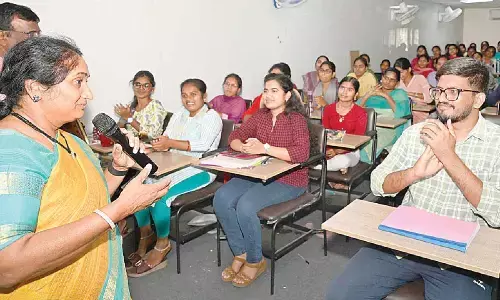Visakhapatnam: Spending quality time with kids essential to guide them in right direction: Experts

Representational image
- When both parents are working, any one of them should be close to the wards so that they can confide in or talk to them when need arises
- Experts recommend a distraction-free atmosphere at home and professional counselling at schools
- Schools and colleges should focus on grooming emotionally stronger students
Visakhapatnam: Kodali Prasanna Kumar knows pretty well to give enough space to his son and not to draw comparisons with his studious daughter.
As a doting father, he showed his children a path to choose their stream, allowed them to learn from mistakes and, more importantly, accepted them as they are. “As parents, we need to be good listeners and supportive of their choices. Also, we need to refrain from spending longer screen time and arguing to set an example for our wards and create a distraction-free ambience at home,” suggests Dr Prasanna Kumar. A psychiatrist by profession, he made sure that he was there for his children when circumstances demanded, guiding them, spotting their abilities and accepting inabilities with equal grace.
In a highly-competitive world where scores are considered ‘be-all and end-all of life,’ how many parents are willing not to rub their aspirations on their wards and set unachievable targets?
Even as children try to get into the groove of coping with highly demanding parents, school and college managements could not settle for anything less than achieving top scores. “Peer pressure becomes inevitable during academic years. When my neighbour’s daughter could score so well, why can’t my daughter aim so?” wonders G Venkata Lakshmi, another parent.
Experts term this sort of comparison as quite ‘dangerous’ and unhealthy as, at times, such expectations might push the child to take extreme step in the long run.
Counsellors say that most problems stem from the family. Absence of proper bonding and caring at home pushes some of the students to a miserable vacuum. “When such a vacuum grows from within, youngsters may resort to any step as they eventually lose resilience. Parents should be aware of their wards’ strengths and weaknesses and never try to force them to set unattainable goals. They should not draw comparisons and make sure their wards consider failures a part of life. Educational institutions should step beyond their targets and help children pick up life skills,” emphasises Dr S Suneeta Kumari, a psychologist.
There is a thin line between giving space and distancing from children. Psychiatrists suggest that it is imperative to know the difference between the two.
Amid a growing tribe of nuclear families, working parents and single child concept, not many are adept at striking a work-life balance. In such a scenario, it is easy for the children to get closer to screens. “Even when both parents are working, any one of them should be close to the wards so that they can confide in or talk to them when need arises. Quality of time spent with children is more important to identify any abnormal sign they show up. Avoiding socialisation, change in behaviour, disturbed sleep patterns and dip in low self-esteem are some of the signs parents should be watchful of,” warns Prabhath Koilada, a psychiatrist, who strongly recommends early medical intervention to help students overcome stress.
As several factors contribute to a spike in student suicides, experts stress that the onus lies on parents and educational institutions to groom emotionally stronger persons and help them cope with stress and deal with failure with ease.
Also, engaging professional counsellors at school level to screen mental health of the students at frequent intervals was emphasised.
Those struggling with suicidal thoughts are advised to contact 100 helpline.








